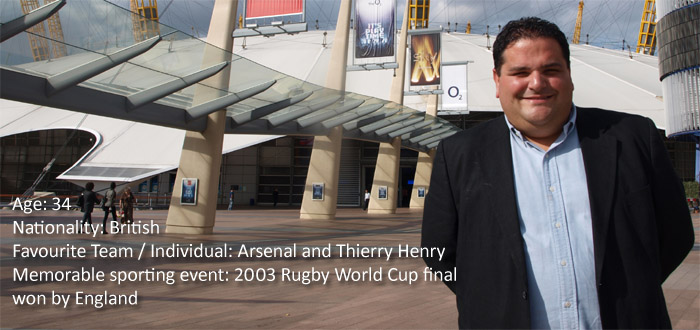PAUL SAMUELS – Executive Director, AEG Global Partnerships
October 11, 2010
By Tristan Mann, News Editor
Paul Samuels is an Executive Director at AEG Europe. He has previously worked for World Online, Genie and O2.
He also launched the European arm of the Bonham Group where he worked on a number of sponsorship and evaluation projects including O2 UK, O2 Ireland, Arsenal FC, The Motor Show and The Alternative Hotel Group.
How did you first get into the sports and entertainment industry and why?
I started at Middlesex University, and once I had finished there I had no idea what I wanted to do, so I just wrote to about 15 or 20 event companies because I had a bit of background in events while at university.
I got a job at an agency who worked for lawyers and barristers organising their conferences, and I was there for just under a year when I was offered a job at a company called World Online as an event manager.
At the time it was a Dutch start up company operating right in the middle of the internet boom, which was brilliant as you had a lot of money to play with.
So I went to join them, and then one day, and this is before email is as big as it is now, I get a fax about an opportunity to sponsor the Dancestar Awards (part of the MOBO Awards), and I ended up negotiating my first ever sponsorship contract. It was a £4 million (US$6.4 million) a year deal for this huge dance/music event.
It went really well, was a great success and from it I became events and sponsorship manager for World Online. Then the CEO went off to work for a company called Genie, which was part of BT, and he asked me if I wanted to go and work for him. So I became sponsorship manager of Genie and we sponsored things like the S Club 7 tour and other music events.
BT Cellnet, which was also owned by BT, and Genie were then de-merged from BT to create a new company called O2, and I subsequently became head of sponsorship at O2.
We were given a brief to go out and launch this brand back in 2002 and so we decided to sponsor high profile brands like Arsenal Football Club, the England rugby team and various music events.
I was at O2 for six years and during my last year there I came across the idea of sponsoring the Millennium Dome, which of course is now The O2
To cut a long story short, we did the deal and then hired an agency called the Bonham Group, who are a US-based agency, who I used to assess the value of the naming rights for the then Millennium Dome. After we finished the deal, I was then asked by the agency to head up their European operations as CEO, so I left O2 to become CEO of the Bonham Group in Europe.
After a year there, Tim Leiweke of AEG approached me and said they wanted to buy the part of the Bonham Group that I had set up. And so we came in house to AEG and I ended up running their sponsorship department.
Did your degree relate to the industry you are in now?
No, I actually started off doing a degree in Hotel Management and I worked at the Waldorf Hotel in London for a year as a management trainee and absolutely loved it. But I looked at the progression opportunities in the hotel business and realised that there were very long hours, not that I was afraid of working long hours, for very little reward.
So in my last year at university I decided to switch two modules of my degree so I could change it to a management and HR degree.
Could you pick out some of your career highlights to date?
My legacy which I am most proud of is the naming of The O2. When I first met AEG I was so inspired by what they had to offer, I went back to the business at O2 and said, “I’ve got this great idea that we should sponsor the Millennium Dome”, everyone looked at me as if was mad, and just said no. But after nearly a year of lobbying and networking, I finally managed to get a couple of colleagues onside which really helped the whole thing.
I think people’s main reservations were the fact the Dome had become a white elephant, it had received huge amounts of bad publicity and had been a total disaster for the government, and on the other side of the coin, it was the, “Who are AEG?” issue. People now know who we are, but at the time, we were just an American company who nobody had heard of in the UK.
I also remember the chairman of O2 at the time saying, all our competitors sponsor football clubs, so surely we should be staying in football?
My philosophy to that was, if our competitors are sponsoring football clubs, surely that’s a reason we shouldn’t be sponsoring football clubs.
Do you think it was helpful that you had worked with O2 before you took up your position at AEG?
Yes, I think it gave me a good knowledge of the telecoms industry, and as our main partner here, I think that definitely helps. At the time of the deal with the Dome I was on the side of the brand, and now I’m on the side of the rights holder, so it lets me see both sides of things, which I think can only be a good thing.



